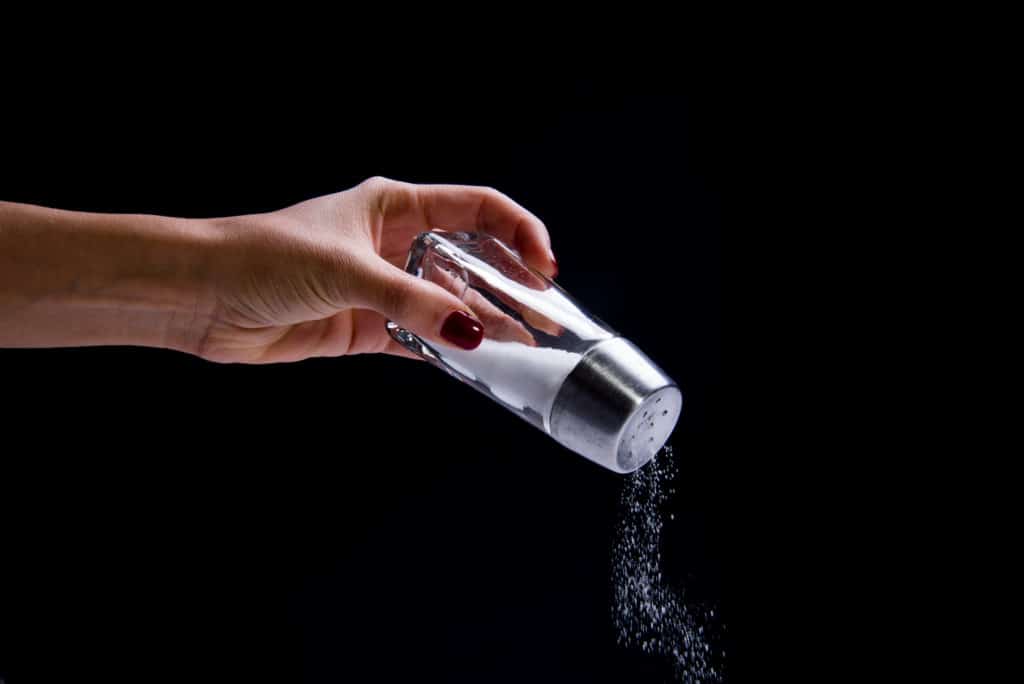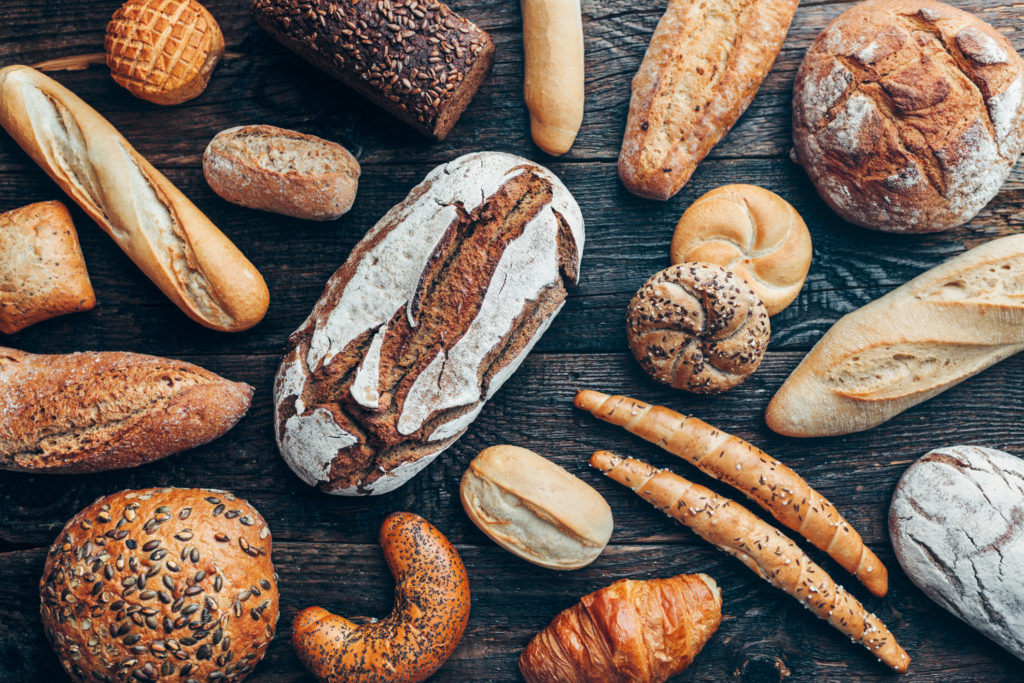Popcorn is whole grain snack that can be included in a kidney diet – as long as you choose a kidney friendly popcorn! Popcorn is low in protein (which is great if you have Chronic Kidney Disease and are not on dialysis). You can eat it by itself, or pair it with some other kidney friendly foods such as nuts or fruit to make a well rounded snack.
This post may contain affiliate links through which we may earn a small commission to help keep this website free.
Table of Contents
Is popcorn good for kidneys?
Yes, popcorn can be a very kidney friendly snack if prepared the right way.
One of the biggest problems with popcorn is the sodium content. Many microwave and pre-made popcorns are high in sodium, and too much sodium in your diet can contribute to high blood pressure, bloating, and fluid build-up. Some popcorn brands contain 5x the sodium than calories (or more!)!
A good rule of thumb is to only buy popcorn that has less sodium than calories.
Popcorn is low in protein, which is good for people who have CKD and are not on dialysis, since they typically follow a lower protein diet. If you are on dialysis, be sure to pair popcorn with some higher protein foods to ensure a well balanced diet.
Is popcorn high in Phosphorus?
No, popcorn is considered a low phosphorus food. One ounce of popcorn contains 101mg of phosphorus, and the phosphorus found naturally in popcorn is poorly absorbed. The amount of phosphorus actually absorbed is estimated to be 30% or about 30mg per ounce, which is quite low.
Some pre-made popcorn can contain phosphorus additives though, which would make those popcorns a high phosphorus food. Phosphorus additives are a major contributor to high phosphorus levels, which can cause damage to your cardiovascular system.
Be sure to find a popcorn with no added phosphates. Phosphorus additives are not common in popcorn, but are more likely to show up in cheese flavored popcorns, so be sure to check the ingredient lists.
Is popcorn high in potassium?
No, popcorn is not considered a high potassium food. One ounce of popcorn contains only 93mg of potassium, which makes it a low potassium food. In general, if a food has less than 200mg of potassium per serving, it is considered a low potassium food.
Popcorn is a whole grain, which means it is higher in fiber than many foods made from refined grain. One ounce of popcorn contains 4 grams of fiber. Fiber is important for your gut health and avoiding constipation. Avoiding constipation can also help you maintain good potassium levels.
Can I eat popcorn if I have CKD and Diabetes?
Popcorn is considered a starchy food, so it will raise your blood sugar if you choose to eat it. The key to enjoying popcorn is to eat it in moderation. Be aware of what is considered a single serving and stick to just that portion.
A typical serving of popcorn is 1 ounce. A good way to portion control popcorn is to measure it out before eating using a gram scale. I personally like to use a plastic drinking cup to portion control my popcorn to ensure I don’t eat too much in one sitting.
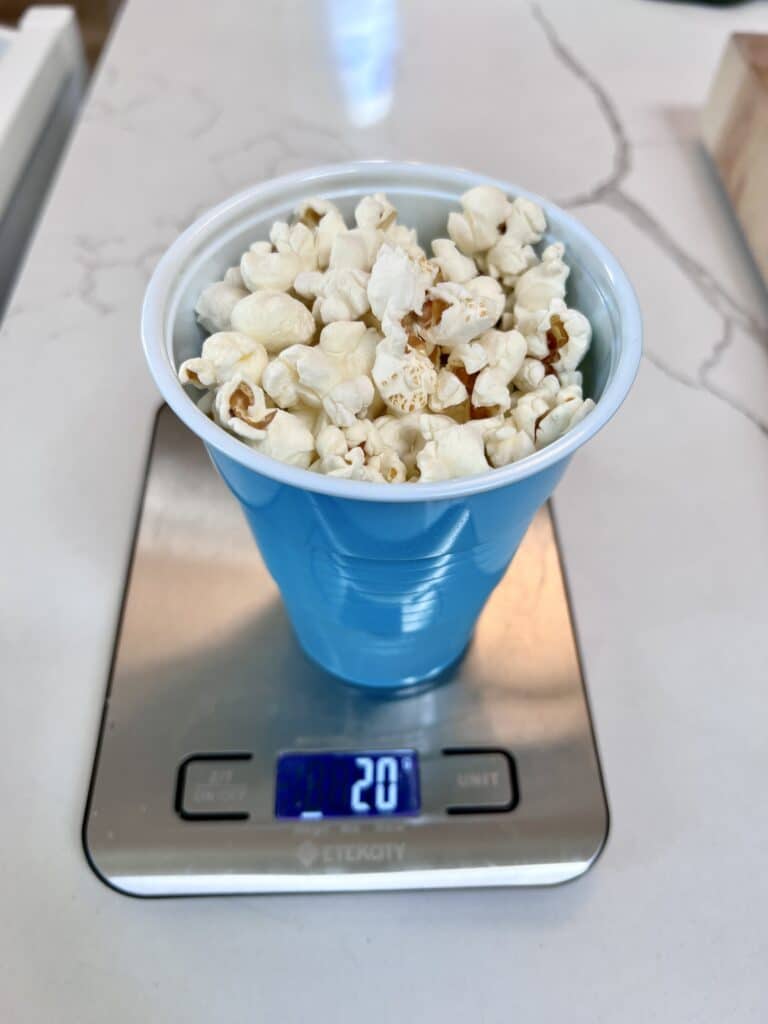
Also, be sure to pair the snack with a healthy fat like nuts. The fat (and fiber) in the nuts will help slow down the absorption of the carbohydrates in the popcorn to help you maintain more even blood sugar.
Consider making your own
Making your own popcorn is an easy way to control the sodium (and is also probably cheaper!).
Be sure to use some sort of fat to cook your popcorn such as coconut oil, butter, or olive oil. This will add some flavor and also help to balance out the carbohydrates to make it a more satisfying snack. Fats such as coconut oil, olive oil, and butter are also extremely low in potassium and phosphorus, so including more of these foods into your day is a good strategy if you are trying to eat less potassium.
Experiment with different seasonings and toppings such as garlic powder, onion powder, nutritional yeast, or even salt in moderation!

Kidney Friendly Popcorn You Can Buy
Below are low sodium, low phosphorus brands of popcorn that you can buy.
Boom Chicka Pop
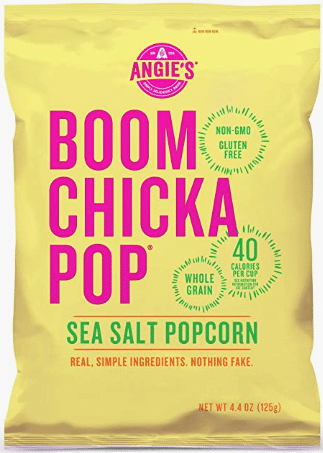
- Calories: 150
- Protein: 2g
- Carbohydrate: 16g
- Fat: 9g
- Sodium: 150mg
- Phosphorus
Additives: None - Potassium: 93mg
- Calcium: 0mg
- Fiber: 2g
- Sugar: 0g
Better Made White Cheddar
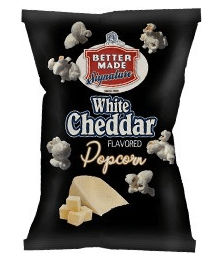
- Calories: 170
- Protein: 2g
- Carbohydrate: 13g
- Fat: 12g
- Sodium: 170mg
- Phosphorus
Additives: None - Potassium: 99mg
- Calcium: 10mg
- Fiber: 2g
- Sugar: 2g
Big and Bold Popcorn Salt & Pepper
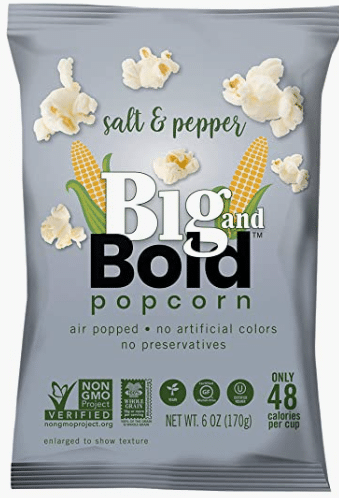
- Calories: 120
- Protein: 3g
- Carbohydrate: 20g
- Fat: 3g
- Sodium: 95mg
- Phosphorus
Additives: None - Potassium: 60mg
- Calcium: 0mg
- Fiber: 2g
- Sugar: 0g
Black Jewell Natural Microwave Popcorn
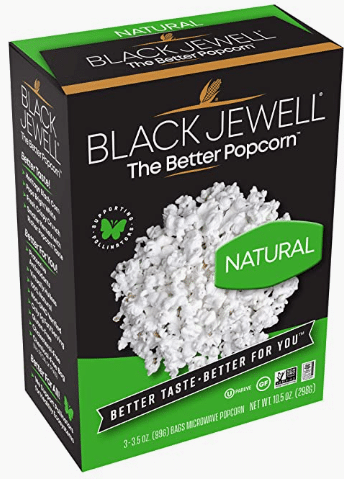
- Calories: 140
- Protein: 3g
- Carbohydrate: 21g
- Fat: 5g
- Sodium: 140mg
- Phosphorus
Additives: None - Potassium: 73mg
- Calcium: 6mg
- Fiber: 4g
- Sugar: 0g
Good & Gather Organic Sea Salt Popcorn
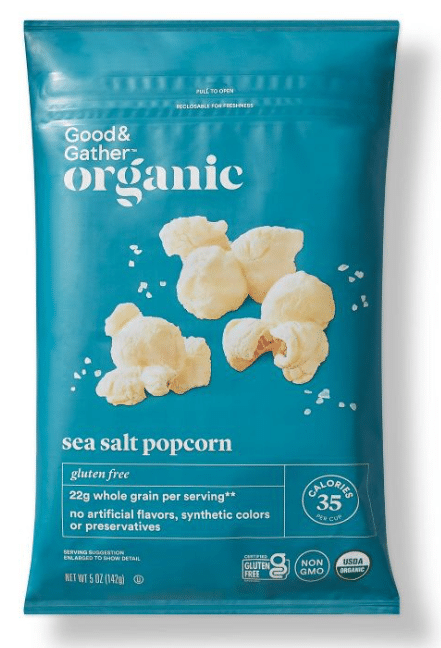
- Calories: 110
- Protein: 2g
- Carbohydrate: 15g
- Fat: 5g
- Sodium: 110mg
- Phosphorus
Additives: None - Potassium: 80mg
- Calcium: 0mg
- Fiber: 4g
- Sugar: 0g
Live Love Pop Truffle Salt Popcorn
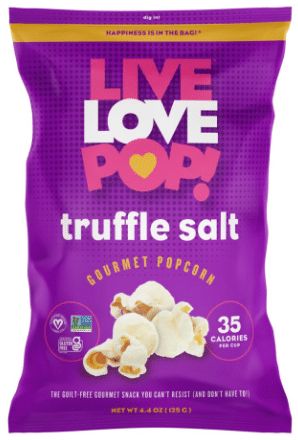
- Calories: 140
- Protein: 2g
- Carbohydrate: 15g
- Fat: 8g
- Sodium: 100mg
- Phosphorus
Additives: None - Potassium: 57mg
- Calcium: 1mg
- Fiber: 3g
- Sugar: 0g
Skinny Pop Popcorn
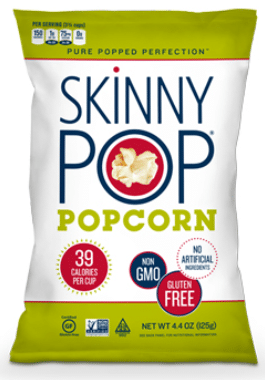
- Calories: 150
- Protein: 2g
- Carbohydrate: 15g
- Fat: 10g
- Sodium: 75mg
- Phosphorus
Additives: None - Potassium: 40mg
- Calcium: 0mg
- Fiber: 3g
- Sugar: 0g




